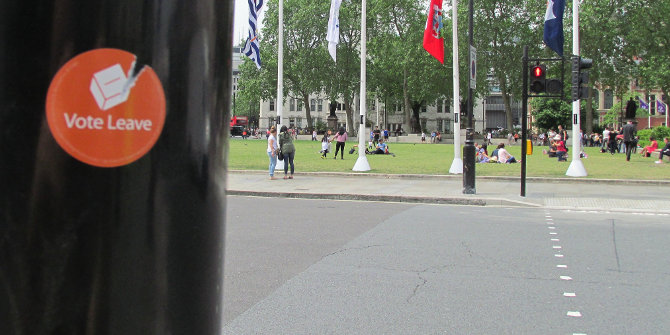 A key aim of the EU’s eastern enlargement was to improve standards of governance and the rule of law in Central and Eastern Europe. Yet as Dimitar Bechev explains, the last 15 years have produced a mixed record. He argues that while the EU cannot offer any silver bullets, it is still a badly-needed ally in strengthening the rule of law in the Balkans. But for enlargement to make good on its original promise, the EU should take a robust stance and call out egregious cases of corruption.
A key aim of the EU’s eastern enlargement was to improve standards of governance and the rule of law in Central and Eastern Europe. Yet as Dimitar Bechev explains, the last 15 years have produced a mixed record. He argues that while the EU cannot offer any silver bullets, it is still a badly-needed ally in strengthening the rule of law in the Balkans. But for enlargement to make good on its original promise, the EU should take a robust stance and call out egregious cases of corruption.
When the EU set out to enlarge its membership in the 1990s, it brought forward three promises to Eastern Europe. First, delivering prosperity which would narrow the gap with the advanced countries in the West. Second, cementing peace and stability in a historically volatile part of Europe at a time when Yugoslavia had gone down in flames. Third, facilitating the good governance and rule of law principles that the EU had been at pains to promote. Post-communist societies needed external help and encouragement to consolidate independent judiciaries, establish robust anti-corruption agencies, depoliticise and upgrade the civil service, and foster a vibrant NGO scene and media capable of holding the powers to be to account.
When the EU enlarged in 2004, the prevailing sentiment was that this third goal had been fulfilled. Central Europe (Slovenia included) and the Baltics met all the benchmarks. Romania and Bulgaria, on the other hand, were an entirely different kettle of fish. While they did make it into the Union in 2007, the accession treaties empowered the European Commission to monitor judicial reforms and issue regular reports, as during the pre-accession period. The so-called Cooperation and Verification Mechanism (CVM) was intended to give the EU leverage to take care of “unfinished business”.
In parallel, lessons learned from the Romanian and Bulgarian cases fed into the design of accession negotiations with the Western Balkans: Croatia and, later on, Montenegro and Serbia. The much-discussed Chapters 23 and 24 (addressing the judiciary and the rule of law) offered a means to maximise pressure on governments to meet EU-set benchmarks in rooting out corruption in high places, not a trivial goal given the difficult legacy bearing on former Yugoslav republics as well as on Albania.
What has happened in the 15-odd years since? The record is at best chequered. The former star pupils have turned into the EU’s worst headache. Back in the day, one could simply write off Bulgaria or Romania as the outliers. But when Hungary and Poland have become textbook examples of state capture through dismantling the very checks and balances that make democracy worthy of its name and ensure transparency and accountability of decision making, it is painfully clear that the vision of Europeanisation is in dire straits.
These are countries which are doing fairly well economically. Citizens enjoy the benefits of free movement within the EU. Growth has returned after the slump of the late 2000s. Indeed, the gap with “core Europe” is being closed. At the same time, Viktor Orbán, in power in Hungary since 2010, has literally written the playbook for semi-autocrats in the region. The strategic use of corruption is at the core of Orbán’s model. The clique of business cronies enriched by means of EU funds is at the heart of what political scientist Bálint Magyar describes as the mafia state. Poland is a somewhat different case, in that the governing Law and Justice (PiS), recently re-elected for another term, has not built a similar class of oligarchs and clients.
But Hungary’s story has a familiar ring to many Romanians and Bulgarians. In, Bulgaria, for instance, the fourth largest lender, Corporate Commercial Bank (KTB), a mammoth political slush fund of sorts, went bankrupt in 2014 as rival factions quarrelled. The state had to fill the gap and pay back depositors to the tune of 2.5 billion euros, a whopping 5% of GDP. After several years of investigations, no one has gone to prison. The reason is simple: all major political parties benefitted from the soft loans dished out by KTB which also financed media organisations.
Romania may have the National Anti-Corruption Directorate sending politicians and well-connected businesspeople to jail, from former Prime Minister Adrian Năstase to ex-president Traian Băsescu’s brother. In Bulgaria, the person who led the KTB case has now been promoted to the all-powerful position of Prosecutor General. These days, the Union is moving forward to abolish the CVM for both Bulgaria and Romania – not because it is not needed, but in acknowledgement of its inefficiency. Instead, the Commission is rooting for the new “rule of law framework” which should apply to all member states, notably Hungary and Poland.
The likes of Hungary and Bulgaria chart the way forward for Serbia, Montenegro, North Macedonia and Albania. All things being equal, these countries are bound to reproduce the same patterns inside the EU. There is no doubt that Aleksandar Vučić is an Orbán lookalike, not an exemplary democrat with deep commitment to the rule of law.
President Emmanuel Macron’s misgivings about enlargement are therefore on target. It is true that France dealt a heavy blow to the EU’s credibility by blocking membership talks with North Macedonia and Albania. Paris’ “non” is not particularly helpful to those who want change and is overall self-serving. Yet the underlying realisation that EU enlargement has not delivered the goods is not off the mark. And if Hungary has proven vulnerable to backsliding, what are the chances of states in the Western Balkans cleaning up their act? The political and financial perks of EU membership could play right into the hands of predatory elites.
It is important not to throw the baby out with the bathwater however. While the EU is far from a silver bullet and suffers from a number of flaws, it is a badly-needed ally in a fight which, at the end of the day, is fought in the domestic arena. Citizens are the main bulwark against state capture and abuse of power, whether as voters or as activists rallying in opposition to a government’s policies or decisions.
For enlargement to make good on its original promise, the European Commission and the European Parliament should take a robust stance and call out egregious acts of high-profile graft. In that way, they will legitimise parties and movements pushing for the rule of law. Sure enough, the EU is bound to work with the elected leaders of the state, whoever they happen to be, but turning a blind eye to bottom-up calls for accountability and fairness would be self-defeating.
Please read our comments policy before commenting.
Note: This article was originally published by the Centre for the Study of Corruption at the University of Sussex in the run-up to the event New Actors and Strategies for Fighting and Investigating Corruption in the Western Balkans (7-8 November). It gives the views of the author, and not the position of EUROPP – European Politics and Policy, nor of the London School of Economics. Featured image: Anti-corruption protest in Bucharest in 2017. Credit: Dan Mihai Balanescu
_________________________________
 Dimitar Bechev – Atlantic Council / University of North Carolina – Chapel Hill
Dimitar Bechev – Atlantic Council / University of North Carolina – Chapel Hill
Dimitar Bechev is a Nonresident Senior Fellow at the Atlantic Council’s Eurasia Center and a research fellow at the Center for Slavic, Eurasian, and East European Studies, University of North Carolina—Chapel Hill. He was formerly a Visiting Fellow at LSEE Research on South Eastern Europe (LSE European Institute) and Director of the Sofia Office at the European Council on Foreign Relations (ECFR), where he covered Turkey and the Western Balkans.





